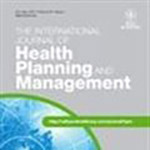New Article in the International Journal of Health Planning and Management
 We’ve recently published a new article focused on research gaps in routine health information system design barriers to data quality and use in low- and middle-income countries. The article has been published in the International Journal of Health Planning and Management, and is now available “online first” from journal’s website.
We’ve recently published a new article focused on research gaps in routine health information system design barriers to data quality and use in low- and middle-income countries. The article has been published in the International Journal of Health Planning and Management, and is now available “online first” from journal’s website.
Lead by CHIP PhD student Manish Kumar, also of the UNC MEASURE Program, the article presents the results of a literature review and argues for adopting an increased focus on systems thinking during health information system design. The full citation list for all articles included within the literature review can be found in the accompanying UNC SILS Tech Report.
The citation for this article and its abstract are included below.
Manish Kumar, David Gotz, Tara Nutley, and Jason B. Smith. Research gaps in routine health information system design barriers to data quality and use in low‐ and middle‐income countries: A literature review. International Journal of Health Planning and Management (Published online on August 2, 2017. To appear in print.).
Abstract: Despite the potential impact of health information system (HIS) design barriers on health data quality and use and, ultimately, health outcomes in low- and middle-income countries (LMICs), no comprehensive literature review has been conducted to study them in this context. We therefore conducted a formal literature review to understand system design barriers to data quality and use in LMICs and to identify any major research gaps related understanding how system design affects data use. We conducted an electronic search across 4 scientific databases—PubMed, Web of Science, Embase, and Global Health—and consulted a data use expert. Following a systematic inclusion and exclusion process, 316 publications (316 abstracts and 18 full papers) were included in the review. We found a paucity of scientific publications that explicitly describe system design factors that hamper data quality or data use for decision making. Although user involvement, work flow, human-computer interactions, and user experience are critical aspects of system design, our findings suggest that these issues are not discussed or conceptualized in the literature. Findings also showed that individual training efforts focus primarily on imparting data analysis skills. The adverse impact of HIS design barriers on data integrity and health system performance may be even bigger in LMICs than elsewhere, leading to errors in population health management and clinical care. We argue for integrating systems thinking into HIS strengthening efforts to reduce the HIS design-user reality gap.
